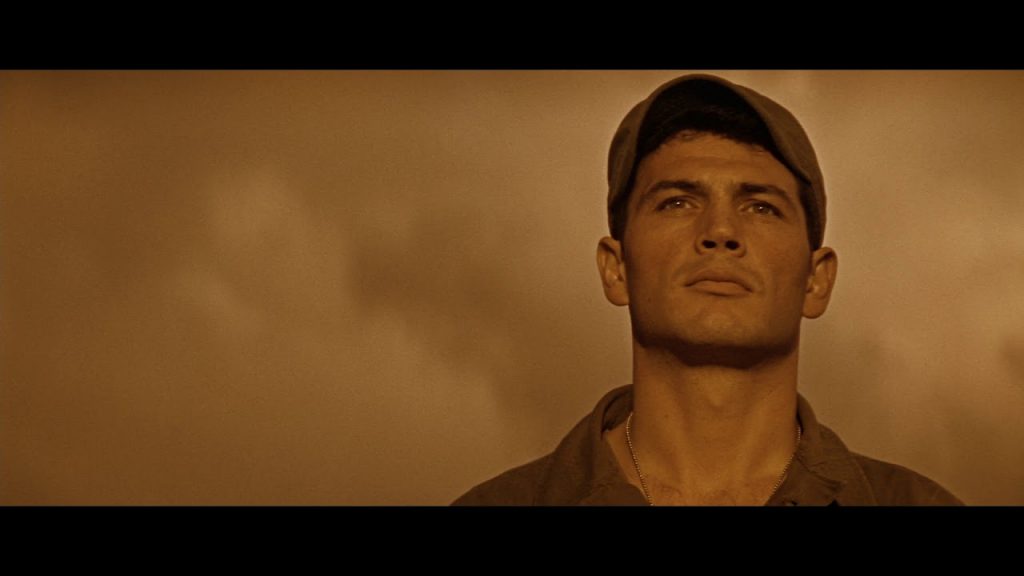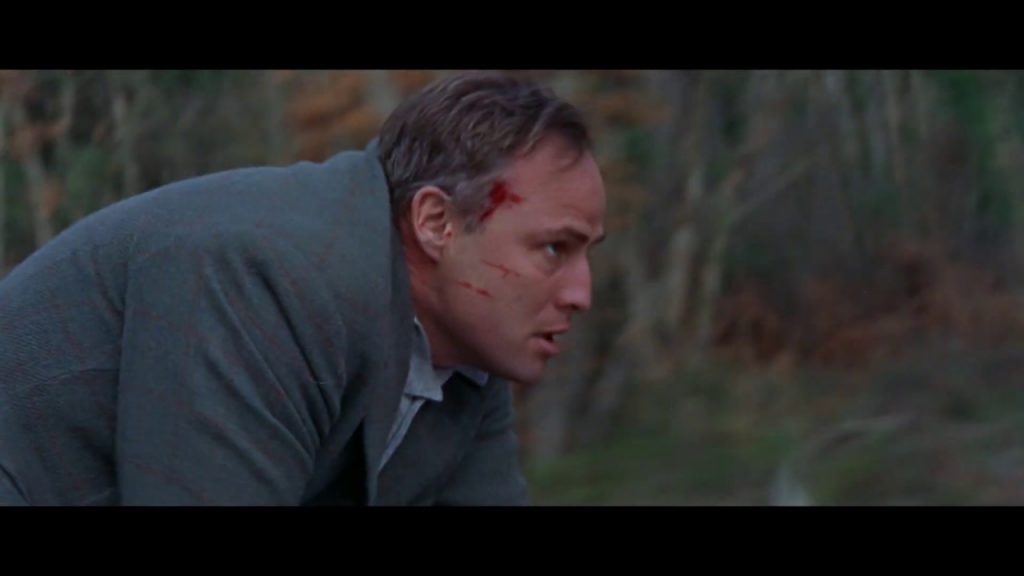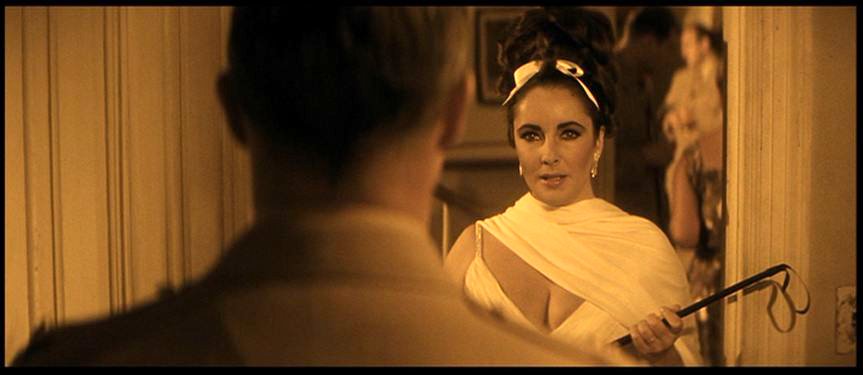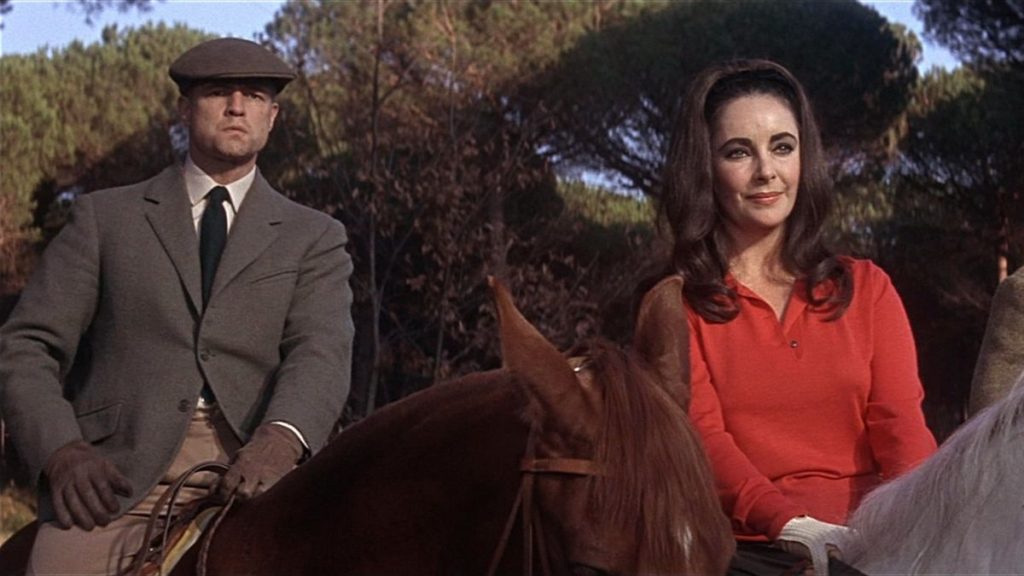Reflections In A Golden Eye is a bizarre film. Bizarre, but definitely not one you should write off. Sometime comfortably in the middle of his long and acclaimed career, John Huston (The Maltese Falcon, Victory) set to work adapting the film from a script based on a novel of the same name by Carson McCullers. The movie was set to tackle tricky subjects such as repressed sexuality, infidelity and voyeurism right on the tail end of the Hays Code, which prevented anything “immoral” from making it to the big screen. Shortly before production began on the film, beloved actor Montgomery Clift, who was set to be the lead in the production, died in July of 1966. Marlon Brando stepped into the role of the sexually repressed Army Major. Upon the release of the film, audiences largely rejected the hyped up melodrama due to many reasons, one of which we will delve into more later. This is a real shame because, while it makes some very bold choices, it is a fascinating, hypnotic ride once you get on its wavelength.
“There is a fort in the South where a few years ago a murder was committed.” This is our introduction to the twisted tale set on a southern Army base in the 1940s. At the center of the action are Major Weldon Penderton (Marlon Brando) and his wife, Leonora (Elizabeth Taylor). The two appear to be husband and wife in name only as the two can scarcely contain their disdain for one another. Leonora is barely trying to hide her affair with their friend and neighbor, Lieutenant Colonel Morris Langdon (Brian Keith), whose own marriage with his deeply depressed wife Alison (Julie Harris) is nearly in shambles. Meanwhile, Weldon is struggling to keep his repressed sexuality at bay during a time where he has no other choice. One day, Weldon ask Private Ellgee Williams (Robert Forster, in his screen debut) to clear some brush from around the house, where he quickly becomes infatuated with Leonora from afar. Williams eventually starts to break into their house to go through Leonora’s personal belongings and to watch her sleep at night. All the while, Weldon is starting to fixate on Williams, especially after witnessing some of his nude excursions in the forest. The entire tale is just bubbling under the surface waiting for things to go sideways.

There are many ways in which this story could be put to the screen, but Huston chooses to go with high melodrama. Everyone is capital “A” acting in this film, especially our leads. Brando conveys the very real internal conflict within Weldon with a bubbling undercurrent that seeps through the screen. Brando is no stranger to going all-in to inhabit a character, and the intensity of his repression almost feels like an assault. Taylor is delightfully over the top as Leonora, who seems unconcerned about most of the events that are happening around her. She is the light at the center of any room, and she wields that power like a weapon. Some of her throwaway lines provide some true laugh out loud moments. On paper, this should be an intensely serious film, but Huston plays up the campiness with some of his camerawork, including the bonkers ending. The tone of this film is all over the place, but if you get on the appropriate wavelength, you might have a lot of fun with it.
One of the big reasons audiences responded so poorly to the film when it was first released was that, although filmed in color, Huston added a golden haze over the film that he felt established a specific tone suitable to the film. This lasted all of a week before weak box office returns caused the studio to reissue the film in full color without the golden effect. Huston was spot on and ahead of his time with his original intention. While not a complete game changer, the “golden” version does put you in a different headspace for this tale of heightened emotions that works really well. Modern audiences are much more accustomed to directors manipulating their color palettes to establish the world they want on screen. Reflections In A Golden Eye is not an under-appreciated masterpiece, but it definitely was not given a fair shake in its initial release. If you embrace the wild melodrama that permeates the proceedings, you might be able to appreciate the heightened reality that Huston has created.

Video Quality
Reflection In A Golden Eye makes its Blu-Ray debut in a very special way thanks to Warner Archive. For the first time on home entertainment, both the “golden” and “full color” versions of the film are available in one package on two discs. Both versions have been given a fresh 2K scan from the interpositives to provide a stunning presentation. The film looks brand new with impressive clarity while maintaining the natural film grain that allows all the textural details to shine through. The level of detail is immense as you survey the production design in the background. The “golden” version offers excellent contrast and has deep black levels. The gold effect really works creatively when viewed through modern eyes in high definition. Those who choose to go with the “full color” version will be greeted with bold colors that jump off the screen. Both versions are true 5-star affairs. By giving consumers a choice of which version to watch within the same package, Warner Archive has righted a wrong that has been perpetuated for years.
Audio Quality
This Blu-Ray comes with a DTS-HD 2.0 Master Audio track that is genuinely quite lovely. One of the standout aspects of the film is Toshiro Mayuzumi’s wonderful score that fills the speakers with warmth. The track does a standout job of balancing this with the dialogue and special effects. As a southerner, the dialogue comes through crystal clear to me, but those who struggle with a thick accent might feel the need to turn on the accompanying optional English (SDH) subtitles. There is no age-related wear present on the track such as hissing or popping. The disc provides an accurate sonic representation of the film that offers up a good dynamic range.

Special Features
- Vintage Behind-The-Scenes Footage: Twenty-three minutes of candid footage from the production underscored by pieces of Toshiro Mayuzumi’s original score. An enjoyable watch, but probably only necessary for the diehards.
- Trailer: A nearly three-minute trailer that badgers the audience with its intensity. The art of the voice over has long gone out of fashion, but it is fascinating to look back at how integral they used to be to sell a film. This does a good job of providing an overview of the film without spoiling everything.
Final Thoughts
Reflections Of A Golden Eye is a misunderstood southern melodrama that trades in seriousness for over-the-top lunacy. This was not a film that was able to tackle as much as it wanted to due to censorship at the time. Yet, it still offered up an immensely entertaining tale of passion and repression with memorable performances from an all-star cast. Warner Archive has swooped in and knocked it out of the park again with a 5-star A/V presentation and the inclusion of both versions of the film. This is the type of presentation where you can tell the studio is looking out for fans. Recommended
Reflections In A Golden Eye can be purchased directly through Warner Archive or various other online retailers.
Note: Images presented in this review are not reflective of the image quality of the Blu-Ray.
Disclaimer: Warner Archive has supplied a copy of this disc free of charge for review purposes. All opinions in this review are the honest reactions of the author.

Dillon is most comfortable sitting around in a theatre all day watching both big budget and independent movies.






